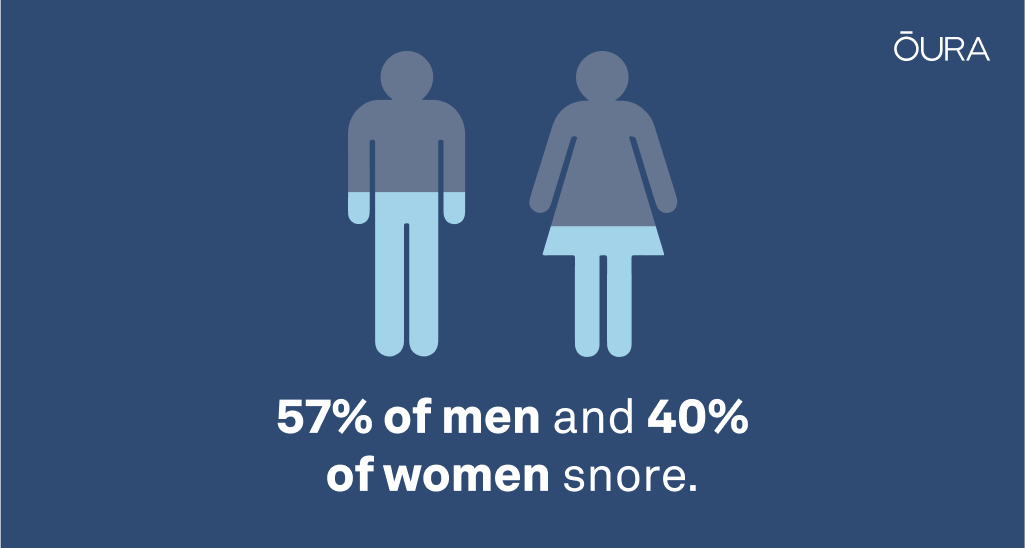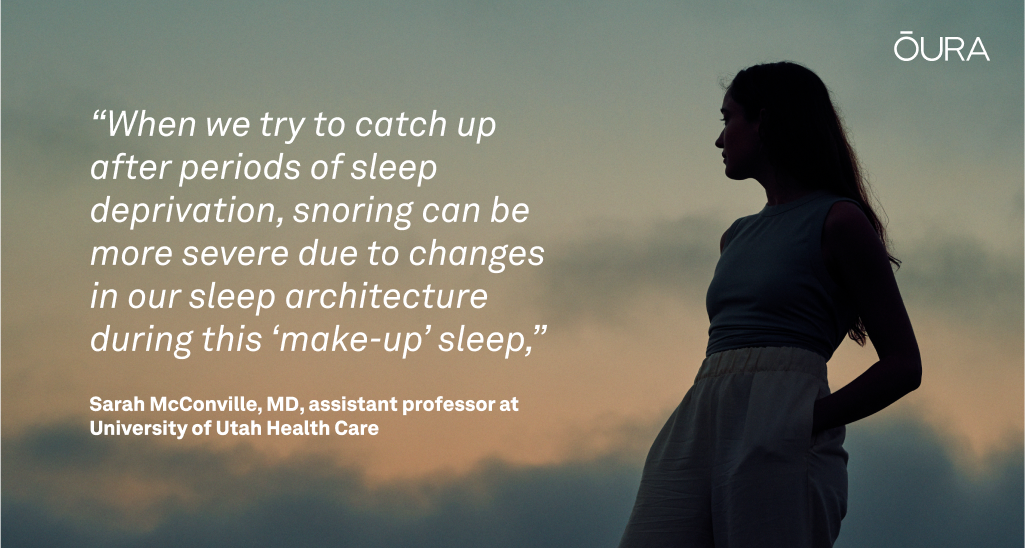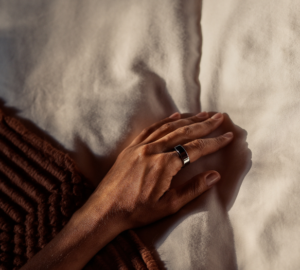Snoring is a widespread problem — studies estimate that 57% of men and 40% of women snore. Not only does it affect your bedfellow’s sleep, but it can also have physical and even social consequences for the snorer.
Snorers tend to wake themselves up during the night — often without realizing it. According to research, this impacts their sleep quality and can lead to anything from poor concentration to a weakened immune system. Additionally, some types of snoring have been linked to health conditions, including obstructive sleep apnea, headaches, and heart abnormalities.
If you’re an Oura member, you can track your sleep and use your Sleep Score (and Sleep Contributors) to understand your sleep cycles and learn about any potential disturbances, such as snoring.
On the Oura App, you can also track your blood oxygen levels (SpO2) during the night too — if it’s lower than 95%, it could indicate a breathing disturbance, such as snoring or sleep apnea.

Lately, a new (and slightly bizarre-sounding) wellness trend has emerged known as “mouth taping.” It uses a special type of tape (in other words, not your average Scotch tape) to prevent you from breathing through your mouth as you sleep, in hopes of improving sleep and preventing snoring.
But does mouth taping really work, and does it have any potential drawbacks? This article will explore some of the causes of snoring, possible treatments, and expert opinions on mouth taping.
What Causes Snoring?
Before you rush out to buy a multipack of mouth tape, you need to understand the mechanisms behind snoring, the different types of snoring — and what kind of snorer you are.
Take a look at the most common types of snoring and their causes and see which feels most familiar.
Tongue-Based Snoring
Tongue-based snoring occurs when the tongue becomes too relaxed and falls to the back of the throat, blocking the airways and causing the sufferer to snore.
Tongue-based snoring tends to occur in people who drink alcohol, sleep on their backs, use sleep medication, or have excessive neck fat.
Nasal Snoring
Nose-based or nasal snoring occurs when the nasal passages become obstructed.
This blockage might be temporary — like having a bunged-up nose caused by allergies, a cold, or flu — or something more permanent, like a deviated septum.
Smokers are also more likely to experience this type of snoring, and some medications can also contribute to it.
Throat-Based Snoring
Throat-based snoring is one of the loudest and most dangerous types, as it’s closely linked to sleep apnea.
Throat-based snoring is usually caused by the soft tissues at the back of your throat collapsing.
This obstructs the airflow temporarily, and the body begins to cough or choke to reopen the airways and start breathing again. This can happen hundreds of times throughout the night, impacting sleep quality.
Lifestyle
People who drink alcohol, smoke, have a poor diet, or are obese are more likely to snore.
Unhealthy lifestyle habits and excess weight can affect respiratory cycles and the body’s natural breathing system, which can contribute to sleep-disrupting breathing problems such as snoring and apnea.
Sleep Deprivation
Snoring can create a vicious cycle of sleep deprivation since going into sleep debt can actually make you snore more.
Sarah McConville, MD, assistant professor at University of Utah Health Care, explains why. “When we try to catch up after periods of sleep deprivation, snoring can be more severe due to changes in our sleep architecture during this ‘make-up’ sleep,” she says.
Therefore, it’s essential to develop healthy sleep hygiene habits to reduce snoring and get a good night’s sleep.

Should You Try Mouth Taping?
The question that’s (literally) on everyone’s lips right now is: does mouth taping work? As with most health questions, the answer is it depends. Here, how several popular methods to stop snoring add up, according to experts:
Mouth Tape
Mouth tape isn’t the regular Scotch tape you find in your kitchen drawer — it’s a porous tape designed for use on human skin. (Do not use Scotch, duct, masking, or any other kind of tape on your mouth!)
Ann Kearney, a voice and swallowing specialist at Stanford University, says that nasal breathing is a “more efficient, effective way of breathing.” The numerous health benefits of nose breathing over mouth breathing may explain why the mouth taping trend has taken off.
They include:
- Humidifying and filtering air as it enters your lungs
- Helping you breathe into your lower lungs (therefore taking deeper breaths)
- Activating your body’s relaxation response
- Filtering allergens, pathogens, and dust
As well as snoring, sleeping with your mouth open also causes dry mouth, cavities, bad breath, a sore throat, and cracked lips, according to Kearney.
A relatively small number of studies have found that mouth taping may be effective as a snoring treatment. However, further research is required to understand whether mouth tape really works.
As Rebecca Robbins, PhD., instructor Harvard Medical School and Oura advisor, tells us, “These products have become popular in recent years, but unfortunately have not been widely evaluated, so we do not have a sense of how efficacious they are for individuals who snore and who might benefit from these products. Speak to your doctor if you are interested in trying these.”
So, the experts have spoken: mouth tape may work, but consult your healthcare provider before trying it.
But what do they say about other snoring treatments?
Nasal Strips
Nasal strips look a bit like Band-Aids shaped to fit your nose. They contain plastic splints that help keep your nasal passages open while you sleep when applied to the bridge of the nose.
One study found that nasal strips significantly reduced snoring and mouth dryness while improving sleep quality.
However, it’s important to note that sleep apnea sufferers were not included in the study since the cause of snoring for them is usually in the throat.
If you’re a nose snorer, it could be worth trying nasal strips to see if they work for you.
Changing Sleeping Position
People who sleep on their backs are more likely to snore, so try experimenting with sleeping on your side or stomach to prevent snoring.
If you really must sleep on your back, keep your head elevated to keep the airway open and prevent the tongue from falling back into your throat.
Shedding Some Weight
Obesity is linked to snoring. Therefore, changing your diet, exercising regularly, and losing weight can help lessen the severity of snoring.
Adopting Healthier Habits
Adopting healthier lifestyle habits, such as reducing alcohol, quitting smoking, and eating a balanced diet, can all contribute to reducing snoring and improving sleep quality.
For example, one study found that eating a healthier diet caused a “significant improvement” in snorers and mild sleep apnea sufferers.

Mouth Taping vs. Nasal Strips: Which Is Better?
Unfortunately, there’s no universal quick fix to stop snoring. As we’ve seen, the best solution for your snoring depends on what type of snorer you are.
If you’re a tongue-based snorer, using mouth tape may help prevent your tongue from falling to the back of your throat.
On the other hand, nasal strips may facilitate nocturnal nose breathing if you’re a nasal snorer. Some people even report good results using a combination of the two.
However, if your snoring is caused by an underlying condition, such as sleep apnea, or lifestyle factors like diet or substance use, mouth taping may not be the best solution.
In any case, it’s always best to consult your healthcare provider before taking any steps to reduce or prevent snoring.
Mouth Taping and Snoring: the Jury’s Still Out
Snoring may sound funny, but it’s no joke. It can disrupt the quality of your sleep — as well as your partner’s — and lead to health conditions ranging from weight gain to heart abnormalities.
In some cases, using mouth tape or nasal strips may lower the decibels and reduce the impact of snoring, but more research is needed to understand how effective they really are.
If your snoring is caused by lifestyle factors, you can take steps such as reducing your alcohol intake, improving your diet, and getting more sleep to address the underlying causes.
And if you’re an Oura member, you can also try our guided meditations in the Explore content and use the Tags and Trends features to track the effectiveness of sleep-inducing activities like yoga, breathing exercises, and meditation.
RELATED: Heart Rate During Sleep: Look for These 3 Patterns
About the Oura Expert
Rebecca Robbins, Ph.D., is an Instructor in Medicine at Harvard Medical School and an Associate Scientist at the Brigham and Women’s Hospital. Her research uses marketing and novel communication tools and technologies (i.e. smartphones and other mobile devices) to design persuasive behavior change interventions to improve sleep and circadian health. In 2011, Dr. Robbins co-authored Sleep for Success! with Dr. James B. Maas. Dr. Robbins’ research has appeared in the New York Times, the Financial Times, and Readers’ Digest, and she has appeared on The Today Show, Live! With Kelly Ripa and Ryan Seacrest, Fox Business News, ABC Nightline, CNBC, and CBS This Morning.





